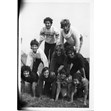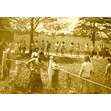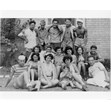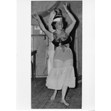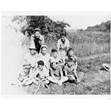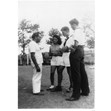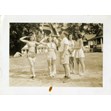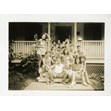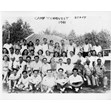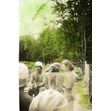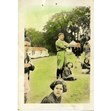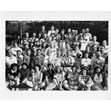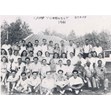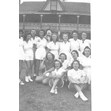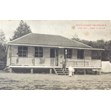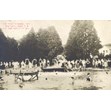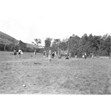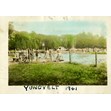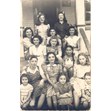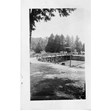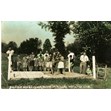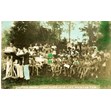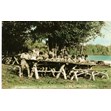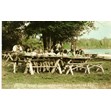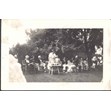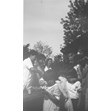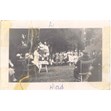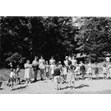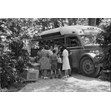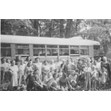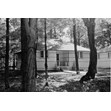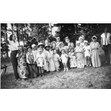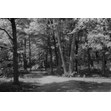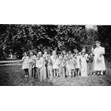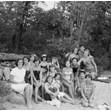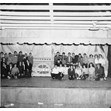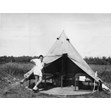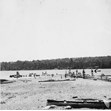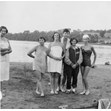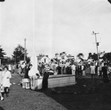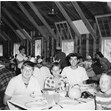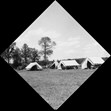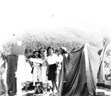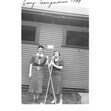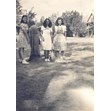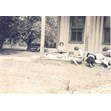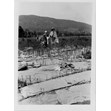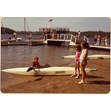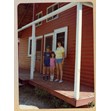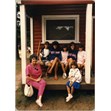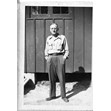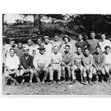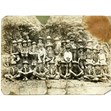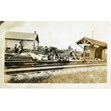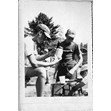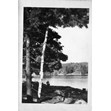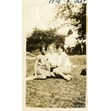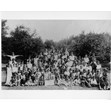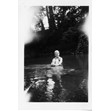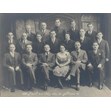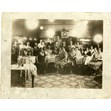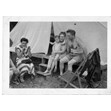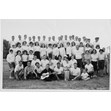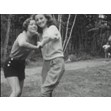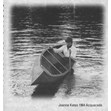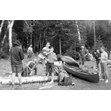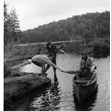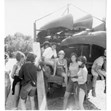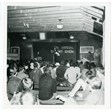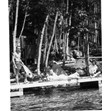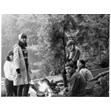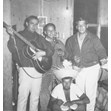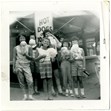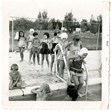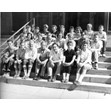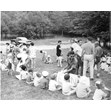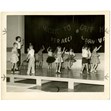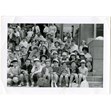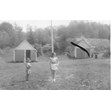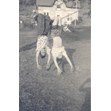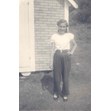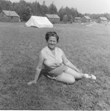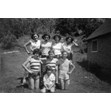- Address
- 52 East Fox Lake Rd.
- Source
- Landmarks
Established in 1933, Camp Winnebagoe was the first Jewish co-educational camp in Canada, owned and operated by Joe and Sadie Danson. First located on the Rouge River, just east of Toronto, the camp moved to a number of different lakeside locations in the Huntsville area, during its long history. In 1971, Camp Winnebagoe purchased Camp Ogama on Fox Lake and it has been there since, operated by the Lustig family. The camp’s programming includes secular and Jewish traditions including themed days, events honouring individual campers’ outstanding contributions and Friday Night Services.
- Address
- 52 East Fox Lake Rd.
- Time Period
- 1933-present
- Scope Note
- Established in 1933, Camp Winnebagoe was the first Jewish co-educational camp in Canada, owned and operated by Joe and Sadie Danson. First located on the Rouge River, just east of Toronto, the camp moved to a number of different lakeside locations in the Huntsville area, during its long history. In 1971, Camp Winnebagoe purchased Camp Ogama on Fox Lake and it has been there since, operated by the Lustig family. The camp’s programming includes secular and Jewish traditions including themed days, events honouring individual campers’ outstanding contributions and Friday Night Services.
- History
- In 1946, David Lieberman founded Camp Ogama, a private a co-educational overnight camp for children aged 6-16, on Fox Lake near Huntsville. It was touted to be “Canada’s most progressive camp for young Jewish boys and girls.” The socially conscience programming offered at Camp Ogama had a profound impact on counselors and campers alike producing highly influential alumni. Former camper journalist Earl Pomerantz reflects, “Camp inoculated us with a passion for justice. And it wasn’t write a check and see you later; this was money where your mouth is.”
- Category
- Camps and Resorts
- Source
- Landmarks
- Address
- 6490 Tilton Lake Road
- Source
- Landmarks
Camp Solelim was founded in 1965 as a Young Judaean camp. Its name comes from Kibbutz HaSolelim in Israel which recognizes the builders who were integral to the establishment of the State of Israel. The program is infused with informal social, Jewish and Zionist educational programs. Like many of the camps founded earlier, campers are encouraged to participate in the functioning of the camp and derive a strong sense of responsibility through daily camp operations and camp projects. The camp still exists today and is jointly operated by the Toronto Zionist Council and Canadian Young Judaea.
- Address
- 6490 Tilton Lake Road
- Time Period
- 1965-present
- Scope Note
- Camp Solelim was founded in 1965 as a Young Judaean camp. Its name comes from Kibbutz HaSolelim in Israel which recognizes the builders who were integral to the establishment of the State of Israel. The program is infused with informal social, Jewish and Zionist educational programs. Like many of the camps founded earlier, campers are encouraged to participate in the functioning of the camp and derive a strong sense of responsibility through daily camp operations and camp projects. The camp still exists today and is jointly operated by the Toronto Zionist Council and Canadian Young Judaea.
- Category
- Camps and Resorts
- Source
- Landmarks
- Address
- 1110 Brydon Bay Road
- Source
- Landmarks
Camp Shalom was founded in 1948 by the Zionist Organization of Canada as a summer camp for youth between the ages of 9 and 13. Located in Gravenhurst, Ontario, Camp Shalom was one of the most successful of the Zionist camps. Camp Shalom was administered by the National Camps Association in conjunction with a regional committee, although, the daily operation and staffing of the camp was provided by Canadian Young Judaea. The camp still exists today and is jointly operated by the Toronto Zionist Council and Canadian Young Judaea.
- Address
- 1110 Brydon Bay Road
- Time Period
- 1948-present
- Scope Note
- Camp Shalom was founded in 1948 by the Zionist Organization of Canada as a summer camp for youth between the ages of 9 and 13. Located in Gravenhurst, Ontario, Camp Shalom was one of the most successful of the Zionist camps. Camp Shalom was administered by the National Camps Association in conjunction with a regional committee, although, the daily operation and staffing of the camp was provided by Canadian Young Judaea. The camp still exists today and is jointly operated by the Toronto Zionist Council and Canadian Young Judaea.
- Category
- Camps and Resorts
- Source
- Landmarks
- Address
- 367 Niece Road
- Source
- Landmarks
Camp Kvutza was established in 1944 by Habonim, a Labour Zionist youth movement, on a farm on the northeastern shores of Lake Erie in Lowbanks, Ontario. The camp was sponsored by the Pioneer Women (now Na’amat), the Poalei Zion and the Farband -- groups affliated with the Toronto Labour Zionist Movement. A major part of the programming at Camp Kvutza involved the celebration of Jewish history and culture and the teaching of Zionist ideals. Kvutza campers were taught to appreciate the values of hard work and love for Israel with an eye on encouraging aliyah. The camp closed in 1965.
- Address
- 367 Niece Road
- Time Period
- 1944-1965
- Scope Note
- Camp Kvutza was established in 1944 by Habonim, a Labour Zionist youth movement, on a farm on the northeastern shores of Lake Erie in Lowbanks, Ontario. The camp was sponsored by the Pioneer Women (now Na’amat), the Poalei Zion and the Farband -- groups affliated with the Toronto Labour Zionist Movement. A major part of the programming at Camp Kvutza involved the celebration of Jewish history and culture and the teaching of Zionist ideals. Kvutza campers were taught to appreciate the values of hard work and love for Israel with an eye on encouraging aliyah. The camp closed in 1965.
- Category
- Camps and Resorts
- Source
- Landmarks
- Address
- Church St. and Rossland Road, west side of Duffins Creek
- Source
- Landmarks
The Toronto Workmen’s Circle was established in 1909 to promote workers rights, the Yiddish language and secular Jewish culture. In addition to running schools, the group founded Camp Yungvelt (Young World) on Lake Wilcox in 1925. A year later, the camp moved to a parcel of land in Pickering donated by a group of Workmen’s Circle members who had purchased the land to establish a Jewish cottage colony. The Workmen’s Circle relied on the generous support of its members at a time when the Jewish community supported the study of Hebrew over Yiddish. In addition to recreational activities, the camp focused on teaching Yiddish language and culture. The camp closed in 1971.
- Address
- Church St. and Rossland Road, west side of Duffins Creek
- Time Period
- 1925-1971
- Scope Note
- The Toronto Workmen’s Circle was established in 1909 to promote workers rights, the Yiddish language and secular Jewish culture. In addition to running schools, the group founded Camp Yungvelt (Young World) on Lake Wilcox in 1925. A year later, the camp moved to a parcel of land in Pickering donated by a group of Workmen’s Circle members who had purchased the land to establish a Jewish cottage colony. The Workmen’s Circle relied on the generous support of its members at a time when the Jewish community supported the study of Hebrew over Yiddish. In addition to recreational activities, the camp focused on teaching Yiddish language and culture. The camp closed in 1971.
- Category
- Camps and Resorts
- Source
- Landmarks
- Address
- Morrison Lake
- Source
- Landmarks
Irene Granovsky, known to staff and campers as “Mrs. G”, founded Balfour Manor Camp on Morrison Lake in the Muskoka Region in 1935. Having previous experience running a day camp on Lake Simcoe, she set out with her husband Ted to create an overnight camp. The property, which had an existing log cabin thought to resemble an English Manor, along with Lord Balfour (architect of the Balfour Declaration that established Palestine as a home for Jewish people in 1917), served as inspiration for the camp name.
- Address
- Morrison Lake
- Time Period
- 1935-1952
- Scope Note
- Irene Granovsky, known to staff and campers as “Mrs. G”, founded Balfour Manor Camp on Morrison Lake in the Muskoka Region in 1935. Having previous experience running a day camp on Lake Simcoe, she set out with her husband Ted to create an overnight camp. The property, which had an existing log cabin thought to resemble an English Manor, along with Lord Balfour (architect of the Balfour Declaration that established Palestine as a home for Jewish people in 1917), served as inspiration for the camp name.
- History
- In addition to activities such as swimming, tennis and horseback riding at Balfour Manor Camp, there were adventurous canoe tripping expeditions down the Severn River to destinations such as Port Carling, Gloucester Pool and Lake Huron. Above all, the camp was recognized for its arts program. At the end of each summer, campers would perform in lavish large-scale productions of musicals and operas. Parents and local cottagers were always invited to enjoy the end of summer performances. The camp closed in 1952.
- Category
- Camps and Resorts
- Source
- Landmarks
- Address
- 2401-05 Ontario Street
- Source
- Landmarks
The Mothers' and Babes' Summer Rest Home located in Bronte and then Tollandale, was first organized in 1919 by Dora Till, Ida Siegel and Lillian Clavir, members of the Hebrew Maternity Aid Society. It was formed in order to provide convalescent care for victims of the influenza epidemic by offering a two week holiday to mothers and young children. First located in a home in Bronte, now Oakville, the Rest Home was officially brought under the auspices of the Hebrew Maternity Aid Society in 1921. By this time the Home had moved from being a convalescent home to being a place of respite in the country for women and children of modest means, although they continued to assist those with poor health.
- Address
- 2401-05 Ontario Street
- Time Period
- 1919-1941
- Scope Note
- The Mothers' and Babes' Summer Rest Home located in Bronte and then Tollandale, was first organized in 1919 by Dora Till, Ida Siegel and Lillian Clavir, members of the Hebrew Maternity Aid Society. It was formed in order to provide convalescent care for victims of the influenza epidemic by offering a two week holiday to mothers and young children. First located in a home in Bronte, now Oakville, the Rest Home was officially brought under the auspices of the Hebrew Maternity Aid Society in 1921. By this time the Home had moved from being a convalescent home to being a place of respite in the country for women and children of modest means, although they continued to assist those with poor health.
- History
- By the late 1930s, a search for a replacement location was underway, as the Bronte Rest Home became ill equipped to deal with the increased demand, primarily due to unsuitable grounds and facilities. In 1941, after selling the home in Bronte, the Mothers' and Babes' Rest Home Committee built a second home on eleven acres of lakefront property in Tollandale, near Barrie. In 1948, the Rest Home was admitted into the Jewish Camp Council, which helped the Committee administer the camp and fill staffing vacancies. Following this move, the Hebrew Maternity Aid Society changed its name to the Mothers' and Babes' Summer Rest Home Association, to better reflect the fact that the home was their only remaining activity. In 1957, the camp expanded its mandate to include the addition of two new programs at its facilities: Camp Family Fun for fathers, mothers, and children up to the age of nine and Camp Good Fellowship, a program for senior citizens over the age of 60. Dora Till was the Rest Home's founding president for a total of 15 years and remained active with the home until it ultimately closed in 1977.
- Category
- Camps and Resorts
- Source
- Landmarks
- Address
- Tollandale Mill Road and Tyndale Road
- Source
- Landmarks
The Mothers' and Babes' Summer Rest Home located in Bronte and then Tollandale, was first organized in 1919 by Dora Till, Ida Siegel and Lillian Clavir, members of the Hebrew Maternity Aid Society. It was formed in order to provide convalescent care for victims of the influenza epidemic by offering a two week holiday to mothers and young children. First located in a home in Bronte, now Oakville, the Rest Home was officially brought under the auspices of the Hebrew Maternity Aid Society in 1921. By this time the Home had moved from being a convalescent home to being a place of respite in the country for women and children of modest means, although they continued to assist those with poor health.
- Address
- Tollandale Mill Road and Tyndale Road
- Time Period
- 1941-1977
- Scope Note
- The Mothers' and Babes' Summer Rest Home located in Bronte and then Tollandale, was first organized in 1919 by Dora Till, Ida Siegel and Lillian Clavir, members of the Hebrew Maternity Aid Society. It was formed in order to provide convalescent care for victims of the influenza epidemic by offering a two week holiday to mothers and young children. First located in a home in Bronte, now Oakville, the Rest Home was officially brought under the auspices of the Hebrew Maternity Aid Society in 1921. By this time the Home had moved from being a convalescent home to being a place of respite in the country for women and children of modest means, although they continued to assist those with poor health.
- History
- By the late 1930s, a search for a replacement location was underway, as the Bronte Rest Home became ill equipped to deal with the increased demand, primarily due to unsuitable grounds and facilities. In 1941, after selling the home in Bronte, the Mothers' and Babes' Rest Home Committee built a second home on eleven acres of lakefront property in Tollandale, near Barrie. In 1948, the Rest Home was admitted into the Jewish Camp Council, which helped the Committee administer the camp and fill staffing vacancies. Following this move, the Hebrew Maternity Aid Society changed its name to the Mothers' and Babes' Summer Rest Home Association, to better reflect the fact that the home was their only remaining activity. In 1957, the camp expanded its mandate to include the addition of two new programs at its facilities: Camp Family Fun for fathers, mothers, and children up to the age of nine and Camp Good Fellowship, a program for senior citizens over the age of 60. Dora Till was the Rest Home's founding president for a total of 15 years and remained active with the home until it ultimately closed in 1977.
- Category
- Camps and Resorts
- Source
- Landmarks
- Address
- 1104 Fish Hatchery Road
- Source
- Landmarks
Camp Ramah has been in operation since 1960 and operates under the educational guidance of the National Ramah Commission and the Jewish Theological Seminary of America. It is governed by the Camp Ramah in Canada Committee. The camp is located in the Muskoka Region of Southern Ontario and is known for its experiential Jewish Education where campers learn Hebrew by singing together as a camp, participating in tefillot (prayers) on the beach and learning about Israel from Mishlachat (Israeli staff).
- Address
- 1104 Fish Hatchery Road
- Time Period
- 1960-present
- Scope Note
- Camp Ramah has been in operation since 1960 and operates under the educational guidance of the National Ramah Commission and the Jewish Theological Seminary of America. It is governed by the Camp Ramah in Canada Committee. The camp is located in the Muskoka Region of Southern Ontario and is known for its experiential Jewish Education where campers learn Hebrew by singing together as a camp, participating in tefillot (prayers) on the beach and learning about Israel from Mishlachat (Israeli staff).
- Category
- Camps and Resorts
- Source
- Landmarks
- Address
- 7861 Chemin River
- Source
- Landmarks
B’nai Brith’s Ottawa Lodge 885 was officially founded in February 1921 with 25 members. The Ottawa Lodge supported a Jewish Boy Scouts camp which evolved into the first Ottawa B’nai Brith summer camp for Jewish youth in 1935. Since 1935, the camp has delivered traditional camping programs to their community regardless of affiliation, denomination or financial means. Their mission has been to provide children and youth with the opportunity to experience the outdoors, learn new skills and develop life-long friendships while enhancing Jewish values, traditions, affiliation and community.
- Address
- 7861 Chemin River
- Time Period
- 1935-present
- Scope Note
- B’nai Brith’s Ottawa Lodge 885 was officially founded in February 1921 with 25 members. The Ottawa Lodge supported a Jewish Boy Scouts camp which evolved into the first Ottawa B’nai Brith summer camp for Jewish youth in 1935. Since 1935, the camp has delivered traditional camping programs to their community regardless of affiliation, denomination or financial means. Their mission has been to provide children and youth with the opportunity to experience the outdoors, learn new skills and develop life-long friendships while enhancing Jewish values, traditions, affiliation and community.
- Category
- Camps and Resorts
- Source
- Landmarks
- Address
- Camperdown
- Source
- Landmarks
Established in 1930, Camp Camperdown was founded in Orillia by the National Council of Jewish Women as an extension to their long-running Jewish Girls’ Club that provided athletic, cultural and vocational programs to working and school age girls in the city. At Camp Camperdown, girls were provided with even greater opportunities to discover and develop their talents and capabilities. By the late 1930s, the camp moved to the Collingwood area and it closed in the mid-1940s.
- Address
- Camperdown
- Time Period
- 1930-ca. 1946
- Scope Note
- Established in 1930, Camp Camperdown was founded in Orillia by the National Council of Jewish Women as an extension to their long-running Jewish Girls’ Club that provided athletic, cultural and vocational programs to working and school age girls in the city. At Camp Camperdown, girls were provided with even greater opportunities to discover and develop their talents and capabilities. By the late 1930s, the camp moved to the Collingwood area and it closed in the mid-1940s.
- History
- The guiding principle to involve campers in the decision-making process at Camp Camperdown proved highly effective. In 1946, an administrative report described, “The children keep very busy. But the things they do are the things they WANT to do, and activities that they plan, they plan together with their counselors.”
- Category
- Camps and Resorts
- Source
- Landmarks
- Address
- 1068 Burlmarie Road
- Source
- Landmarks
Located on the Lake of Bays in Muskoka, Camp New Moon began as a family lodge in the early 1930s. It was transformed into a children’s camp in the 1950s. In 1959, the camp was purchased by Al Goodman and Bert Fine (who ran Bathurst Manor Day Camp, later renamed to Forest Valley) who operated the camp together until around 1960 when Goodman assumed full ownership. Since the 1990s, the camp has been operated by Al’s son Jack and his wife Sue. The camp continues to flourish, providing campers the same experience that has existed for 60 years. There are now third generation campers attending.
- Address
- 1068 Burlmarie Road
- Time Period
- 1959-present
- Scope Note
- Located on the Lake of Bays in Muskoka, Camp New Moon began as a family lodge in the early 1930s. It was transformed into a children’s camp in the 1950s. In 1959, the camp was purchased by Al Goodman and Bert Fine (who ran Bathurst Manor Day Camp, later renamed to Forest Valley) who operated the camp together until around 1960 when Goodman assumed full ownership. Since the 1990s, the camp has been operated by Al’s son Jack and his wife Sue. The camp continues to flourish, providing campers the same experience that has existed for 60 years. There are now third generation campers attending.
- Category
- Camps and Resorts
- Source
- Landmarks
- Address
- 1391 Stoneleigh Road, RR#2
- Source
- Landmarks
In 1921, the 59th Troop - the first Jewish Boy Scout troop in Ontario - was established in Toronto. During the early years, the troop met at the Orde Street School. In 1922, a summer camp was opened for the Jewish scouts from this troop. The camp was situated on Buckhorne Lake, near Port Bolster. It moved to Lake Couchiching in 1934 and in 1939 acquired a property on Duck Lake near Bracebridge, Ontario. Camp Tamarack, as it was called, provided the boys with an opportunity to leave the city and learn new outdoor skills. The camp operated until 1972. The Camp Tamarack of today is located on the same lake but is not connected to this early Boy Scout camp.
- Address
- 1391 Stoneleigh Road, RR#2
- Time Period
- 1922-1972
- Scope Note
- In 1921, the 59th Troop - the first Jewish Boy Scout troop in Ontario - was established in Toronto. During the early years, the troop met at the Orde Street School. In 1922, a summer camp was opened for the Jewish scouts from this troop. The camp was situated on Buckhorne Lake, near Port Bolster. It moved to Lake Couchiching in 1934 and in 1939 acquired a property on Duck Lake near Bracebridge, Ontario. Camp Tamarack, as it was called, provided the boys with an opportunity to leave the city and learn new outdoor skills. The camp operated until 1972. The Camp Tamarack of today is located on the same lake but is not connected to this early Boy Scout camp.
- Category
- Camps and Resorts
- Source
- Landmarks
- Address
- Rouge Hills
- Source
- Landmarks
In 1925, a group of six women from the Jewish Women’s Labour League, namely Rae Watson, Becky Lapedes, Leah Linzon, Bella Goodis, Gertie Blugerman, and Ethel Tempkin, rented a cottage in Long Branch and scheduled vacations so their children could be supervised outside the city near Lake Ontario. The following year, the group, together with Tillie Chikovsky, rented a farm in Rouge Hills, Ontario, twenty-five miles southeast of Toronto. They established a children's summer camp, which they initially named Camp Kindervelt. Later, the camp was renamed Camp Naivelt.
- Address
- Rouge Hills
- Time Period
- 1925-1970
- Scope Note
- In 1925, a group of six women from the Jewish Women’s Labour League, namely Rae Watson, Becky Lapedes, Leah Linzon, Bella Goodis, Gertie Blugerman, and Ethel Tempkin, rented a cottage in Long Branch and scheduled vacations so their children could be supervised outside the city near Lake Ontario. The following year, the group, together with Tillie Chikovsky, rented a farm in Rouge Hills, Ontario, twenty-five miles southeast of Toronto. They established a children's summer camp, which they initially named Camp Kindervelt. Later, the camp was renamed Camp Naivelt.
- History
- At the time, the camp committee rented a dilapidated farmhouse which they furnished from their own homes. Adults set up their own camp in tents. However, overcrowding soon became a challenge, which prompted the group to search for larger grounds. In 1936, Camp Naivelt moved to Eldorado Park in Brampton, ON. The children's camp operated under the name of Camp Kinderland, while the adult portion was called Camp Naivelt. After many successful years, Camp Kinderland ceased to operate as an overnight camp in 1962 but continued as a children's day camp until 1970. Throughout its existence, Camp Naivelt had a significant impact on the lives of many children and adults, providing a unique space for Jewish socialists to come together, build community, and share their ideals.
- Category
- Camps and Resorts
- Source
- Landmarks
- Address
- Eldorado Park
- Source
- Landmarks
In 1935 the Labour League (later the United Jewish People's Order) bought Eldorado Park near Brampton, Ontario from the Canadian National Railway to establish Camp Naivelt. The camp opened in 1936 and functioned as a camp for children and families and ran a teacher training facility. Political and social activism was a significant part of Camp Naivelt. Its mission was to promote progressive socialist philosophy, tightly integrated with secular Jewish and Yiddish cultural traditions. A key element of the Camp Naivelt mission was to foster a deep and meaningful understanding of secular Jewish culture and folklore, the Yiddish language, music, folk art and dance.
- Address
- Eldorado Park
- Time Period
- 1936-present
- Scope Note
- In 1935 the Labour League (later the United Jewish People's Order) bought Eldorado Park near Brampton, Ontario from the Canadian National Railway to establish Camp Naivelt. The camp opened in 1936 and functioned as a camp for children and families and ran a teacher training facility. Political and social activism was a significant part of Camp Naivelt. Its mission was to promote progressive socialist philosophy, tightly integrated with secular Jewish and Yiddish cultural traditions. A key element of the Camp Naivelt mission was to foster a deep and meaningful understanding of secular Jewish culture and folklore, the Yiddish language, music, folk art and dance.
- History
- At its peak in the 1950s, Camp Naivelt had approximately 90 small cottages, a communal dining hall, a dance hall, a youth recreation hall, a grocery store and a camp office. The community also included a camp director’s cabin, arts and crafts cabin, infirmary, and a communal washroom and shower area known as, “The Ritz”. Activities ranged from lectures on current issues, films, poetry readings, Yiddish theatre, kultur vinkls (cultural corners), folk dancing and singing to boating and swimming, volleyball and other sports tournaments, hikes and nature walks and campfires. Some 300 children would attend camp during the summer and, at its height during the 1940s and 1950s, as many as 5000 people would fill Camp Naivelt on a summer weekend.
- Category
- Camps and Resorts
- Source
- Landmarks
- Address
- 1485 Murphy Rd.
- Source
- Landmarks
Camp Moshava was founded in 1962 in the Kawartha Lakes Region on Lake Buckhorn. Affiliated with the Zionist youth movement B’nei Akiva, Moshava is one of several camps they operate in North America.
- Address
- 1485 Murphy Rd.
- Time Period
- 1962-present
- Scope Note
- Camp Moshava was founded in 1962 in the Kawartha Lakes Region on Lake Buckhorn. Affiliated with the Zionist youth movement B’nei Akiva, Moshava is one of several camps they operate in North America.
- History
- Historically, the primary aim of the movement was to promote avodah, specifically agricultural work in the field and aliyah, migration to Israel. Today, Camp Moshava provides an informal environment for campers to encounter Judaism through programming and observances that promote Torah education, prayer and Zionist ideals.
- Category
- Camps and Resorts
- Source
- Landmarks
- Address
- 1 Arowhon Road
- Source
- Landmarks
Camp Arowhon has been owned and operated by the Kates family since 1934. It is located on a private lake in Algonquin Provincial Park. Matriarch Lillian Kates established this family business, three generations long, in 1934. A formidable entrepreneur, Kates was undeterred by obstacles of the day such as adventurous travel through Ontario’s wilderness, anti-Semitism, sexism and a lack of financial resources. She passionately pursued her dream of creating a unique Canadian summer camp and single handedly recruited all of its first campers.
- Address
- 1 Arowhon Road
- Time Period
- 1934-present
- Scope Note
- Camp Arowhon has been owned and operated by the Kates family since 1934. It is located on a private lake in Algonquin Provincial Park. Matriarch Lillian Kates established this family business, three generations long, in 1934. A formidable entrepreneur, Kates was undeterred by obstacles of the day such as adventurous travel through Ontario’s wilderness, anti-Semitism, sexism and a lack of financial resources. She passionately pursued her dream of creating a unique Canadian summer camp and single handedly recruited all of its first campers.
- History
- When Kates’ son Eugene took over as director, he set up Arowhon’s unique system where campers independently chose their daily activities. True to the inspiration of its name-Samuel Butler’s Utopian novel “Nowhere” spelt backwards “Erehwon”-Arowhon did indeed become “a perfect world for children”. Today the camp is operated by Eugene’s daughter Joanne Kates, the celebrated food critic.
- Category
- Camps and Resorts
- Source
- Landmarks
- Address
- 1612 Dudley Rd
- Source
- Landmarks
In 1958, Camp Timberlane was founded by Barry and Philomena Lowes on the shores of the Lake of Two Islands in the Haliburton Highlands. Their vision was to create a camping experience that would build confidence, spirit and leadership. They strived to provide a nurturing environment that recognized a person’s uniqueness and where values would be learned that would benefit them over a lifetime. The tradition continues today and is being carried out by the present Director and Owner Corey Mandell who attended Timberlane as a camper and counselor.
- Address
- 1612 Dudley Rd
- Time Period
- 1958-present
- Scope Note
- In 1958, Camp Timberlane was founded by Barry and Philomena Lowes on the shores of the Lake of Two Islands in the Haliburton Highlands. Their vision was to create a camping experience that would build confidence, spirit and leadership. They strived to provide a nurturing environment that recognized a person’s uniqueness and where values would be learned that would benefit them over a lifetime. The tradition continues today and is being carried out by the present Director and Owner Corey Mandell who attended Timberlane as a camper and counselor.
- Category
- Camps and Resorts
- Source
- Landmarks
- Address
- Black Lake
- Source
- Landmarks
Camp Massad located in Torrance, Ontario, was a summer camp for Jewish Canadian youth co-sponsored by the Zionist Organization of Canada and Karen Hatarbut. Camp Massad was in operation from 1948 to 1977. The camp was situated on Black Lake. It was the only Hebrew-speaking camp in Ontario and was under the jurisdiction of the Ontario Camps Association.
- Address
- Black Lake
- Time Period
- 1948-1977
- Scope Note
- Camp Massad located in Torrance, Ontario, was a summer camp for Jewish Canadian youth co-sponsored by the Zionist Organization of Canada and Karen Hatarbut. Camp Massad was in operation from 1948 to 1977. The camp was situated on Black Lake. It was the only Hebrew-speaking camp in Ontario and was under the jurisdiction of the Ontario Camps Association.
- Category
- Camps and Resorts
- Source
- Landmarks
- Address
- 1335 Camp White Pine Ct.
- Source
- Landmarks
Camp White Pine, a children’s summer camp located in the Haliburton Highlands outside of Toronto was founded by Joe Kronick in 1956. Joe's son, Adam, took over as director of Camp White Pine in 1987. He has run the camp with his wife, Dana, as co-Director since 1990.
- Address
- 1335 Camp White Pine Ct.
- Time Period
- 1956-present
- Scope Note
- Camp White Pine, a children’s summer camp located in the Haliburton Highlands outside of Toronto was founded by Joe Kronick in 1956. Joe's son, Adam, took over as director of Camp White Pine in 1987. He has run the camp with his wife, Dana, as co-Director since 1990.
- Category
- Camps and Resorts
- Source
- Landmarks
- Address
- 1030 Lower Lions Club Road
- Source
- Landmarks
Camp Kadimah is a day camp for children between the ages of 2-14 operated by the Hamilton Jewish Community Centre.
- Address
- Lake Waseosa
- Source
- Landmarks
Camp Revivim, a Labour Zionist camp, was founded in 1951 by M. Federman, H. Green, B. Himel and A. Ben Gurion (nephew of David Ben Gurion) at Hockley Valley, Orangeville. A permanent location was purchased in 1953 at Lake Waseosa near Huntsville. In 1962, Camp Revivim (serving children from Toronto) joined with Camp Kissufim (serving children from Ottawa and Montreal) for one summer. The following summer, the two camps merged to form Camp Gesher.
- Address
- Lake Waseosa
- Time Period
- 1951-1962
- Scope Note
- Camp Revivim, a Labour Zionist camp, was founded in 1951 by M. Federman, H. Green, B. Himel and A. Ben Gurion (nephew of David Ben Gurion) at Hockley Valley, Orangeville. A permanent location was purchased in 1953 at Lake Waseosa near Huntsville. In 1962, Camp Revivim (serving children from Toronto) joined with Camp Kissufim (serving children from Ottawa and Montreal) for one summer. The following summer, the two camps merged to form Camp Gesher.
- Category
- Camps and Resorts
- Source
- Landmarks
- Address
- 1 Camp Gesher’s Rd
- Source
- Landmarks
Camp Gesher originated in 1963 from a merger between Camp Revivim (serving campers from Ottawa and Toronto) and Camp Kissufim (serving campers from Montreal). It is part of Habonim Dror, the Labour-Zionist youth movement and is located near Cloyne, Ontario.
- Address
- 1 Camp Gesher’s Rd
- Time Period
- 1963-present
- Scope Note
- Camp Gesher originated in 1963 from a merger between Camp Revivim (serving campers from Ottawa and Toronto) and Camp Kissufim (serving campers from Montreal). It is part of Habonim Dror, the Labour-Zionist youth movement and is located near Cloyne, Ontario.
- History
- Camp Gesher’s small size is central to the spirit of the camp where a culture of acceptance, individuality and mutual respect is fostered. The camp philosophy revolves around socialist ideals and its structure is similar to that of a kibbutz. Hebrew is used in day-to-day conversation and there are many opportunities to learn about Jewish and Israeli history and culture. There is a kosher kitchen and Shabbat and Havdalah are celebrated.
- Category
- Camps and Resorts
- Source
- Landmarks
![Camp Solelim group photo on the beach, [198-]. Ontario Jewish Archives, Blankenstein Family Heritage Centre, accession 2014-10-3.|](/media/Digital Assets/2014-10-3/2014-10-3_010.jpg?width=111&height=111&404=no-img.jpg)
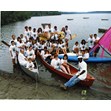
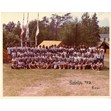
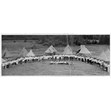
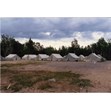
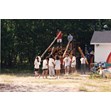
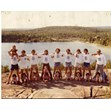
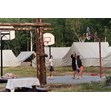
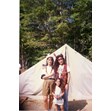
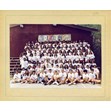

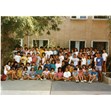
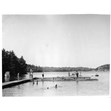

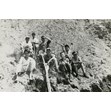
![Dancers at Folk Festival, Camp Kvutza, Lowbanks, [195-]. Ontario Jewish Archives, Blankenstein Family Heritage Centre, accession 1992-9-5.|](/media/Digital Assets/1992-9-5/1992-9-5_1.jpg?width=111&height=111&404=no-img.jpg)
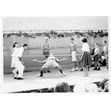
![Folk festival at Camp Kvutza, Lowbanks, [195-]. Ontario Jewish Archives, Blankenstein Family Heritage Centre, 1992-9-5.|](/media/Digital Assets/1992-9-5/1992-9-5_018.jpg?width=111&height=111&404=no-img.jpg)
